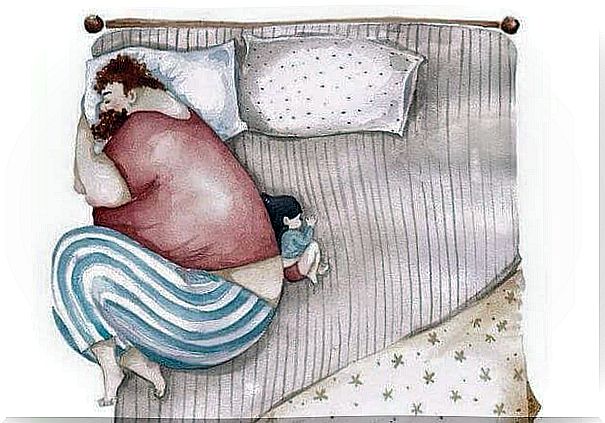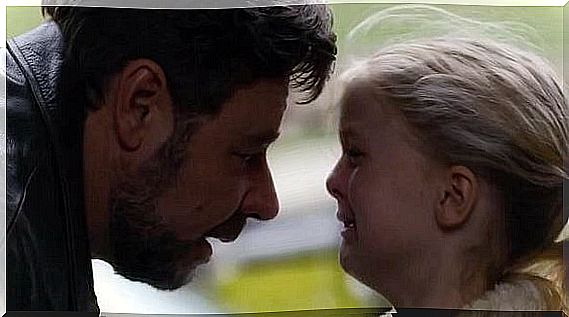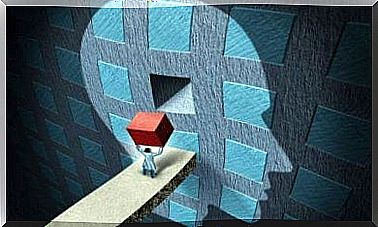Parents And Children: The Trace Of A Father’s Abandonment

The imprint that the abandonment of the father creates in a child produces an emotional void of great dimensions. This huge hole ends up isolating, depressing and promoting the emotional destructuring of our personal reality at all levels.
We know, thanks to decades of attachment studies, that healthy affective bonds guarantee the development of a fulfilling life in which healthy relationships, healthy self-esteem, and security and trust in others will reign. For its part, insecure attachment leads us to insecurity, low self-esteem and mistrust in the people around us.
A negative emotional bond between parents and children generates destructive behaviors and enormous anguish. Thus, carrying out an exercise of introspection and subsequent distancing on this fact will help us to understand and elaborate it to guarantee a greater emotional liberation and, therefore, structuring of our personality (that is, of our way of behaving with ourselves and with the environment).
Therefore, in this article, we are going to try to shed light on this to redirect our emotional reality.

The Difficulty of Defining a Father and the Relationship of Abandonment
Today we talk about family relationships more easily than in the past. However, when one has had to deal with the figure of an absent father who also left the family home for whatever reason, we have to deal with a definition of the indescribable.
Thus, in these cases, when someone is asked about his father, he can only hesitate, lower his gaze and respond in a diffuse and evasive way. This makes clear the difficulty of defining the sentimental void and managing the scars that abandonment leaves on us.
In this regard, we must emphasize that there are many types of abandonment. In fact, we could talk about as many types as there are cases in the world. Among the most common we find:
- If we pay attention to the socio-emotional reality of our environment, we will understand that this form of upbringing has been very common over the years.
- The pain of physical and emotional abandonment by choosing the figures of reference sows important seeds in our maturation. It is difficult to manage the reality that we have to live in these cases. Because … how do you assume that a person who should accompany you for many years in your life chooses to get away from you in some way?
- This abandonment will most likely be called treason. Therefore it requires a very conscious verbal elaboration.
- Here we find several options:
- The father who died early and did not have the possibility to play his role in our life.
- The father who died but we knew. In this profile, longing and idealization will create a characteristic void.

Managing a destroyed or destructive link
The psychological elaboration at the emotional level and at the thought level not only depends on the child, but on the environment as a whole. The shadow of the absent father always grips, in one way or another, family life.
On the other hand, it is possible that, depending on our position in the family hierarchy, some of the family members assume the role of parents without being so out of compassion or necessity; It can also happen that we are the ones who feel the pressure to handle certain circumstances.
For its part, the eternal statement of what we consider father stands out, a common dilemma with complicated implications. The natural thing is that the emotional father is also the father who begot us; however, as we see, this is not always the case.

In this way, we must emphasize that depending on the evolutionary moment and the circumstances surrounding the abandonment, we will assume certain qualities, tasks, obligations or roles that do not correspond to us. Thus, we must emphasize that:
- If that figure is lacking in one way or another in early childhood (0-6 years), it is difficult to achieve the emotional fulfillment that this stage requires in which we cement our growth.
- If the abandonment occurred in second childhood (6-12 years), the difficulty of consolidating the base of healthy attachment will also be diminished (not destroyed). Likewise, in adolescence, a stage in which it is essential to have support, a reference and very precise limits, it is easy for the acquisition of a solid identity to become unstructured.
- In the case of childhood and adolescence, evolutionary moments in which the personality is not structured, anxiety, sadness and the pain of a loss will profoundly mark our way of being and of relating to the world.
- This is, in other words, the genesis of an internal lack of structure that naturally should not have occurred. For this reason, it is an especially traumatic event that will mark our essence and our way of relating to others.
- When the abandonment occurs in youth and even in adulthood, the elaboration that is required acquires other shades, since the absence and abandonment of the father generate incongruities in oneself and the way one has to establish relationships.
- It is common to see ourselves invaded by insecurity, mistrust and fear of being betrayed. Because irrefutable abandonment in adulthood quickly builds up as betrayal. At this moment we have to do a much more conscious emotional reading and, therefore, we will feel the need to put words into it.
When we put words to it, the tints of abandonment are more stark, because we do not anesthetize reality but, probably, we even obscure it even more. Be that as it may, our armor becomes harder and, at the same time, more fragile, making the reconstruction more complicated.

Relieve the pain to live with the loss
Note that we are not talking about overcoming the loss, but about living with it. Losing a few keys and even our favorite toy can be overcome, but overcoming the loss of a parent is impossible.
This should be understood this way because it is unreality to believe that something with such an affective charge can come to not matter to us at all.
Crafting and managing the imprint of a parent’s abandonment requires individual and family forgiveness that is not always easy to achieve. If our environment constantly punishes the figure of our father, if we observe great pain in our mother, in our brothers or in our grandparents, we probably project that same mourning within us.
Becoming aware of this translates into progress, as we will tend to separate the pain of others and our own. Obviously, both make up a cocktail that will make us vulnerable in a way forever.
But this will help us not to store the pain or the emotions that accompany it to continue taking light steps on our emotional path.









